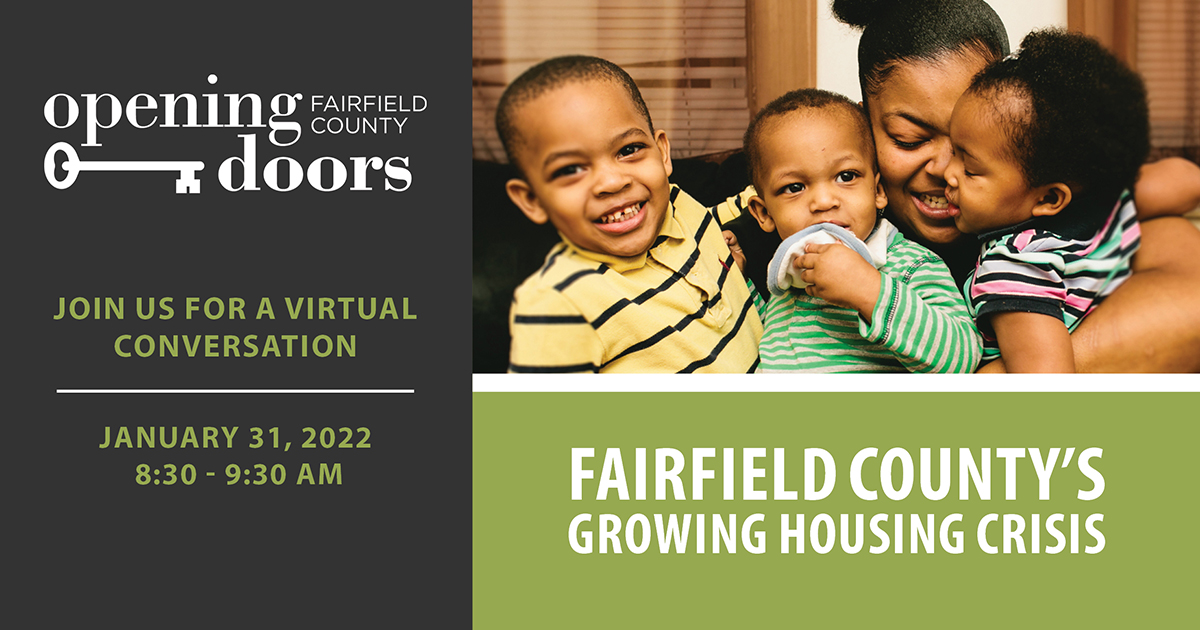
Fairfield County, Conn. – Although
strides have been made to house the chronically homeless during the COVID-19
pandemic, there are serious obstacles to continuing this work across our state
and county. On Monday, January 31, Opening Doors Fairfield County (ODFC), the area’s
collective impact organization of more than 150 stakeholders working to end
homelessness, held a virtual conversation for lawmakers, stakeholders, and
media to discuss the current housing crisis and legislative priorities.
Although Connecticut is a leader in addressing
homelessness, we must come together to ensure our providers have the resources
they need to continue making strides in the mission to ensure homelessness is rare,
brief, and non-recurring. ODFC’s is advocating for:
Increased funding to support Coordinated Access Networks and 211
Coordinated Access Networks organize how homeless services are provided,
maximize resources, create system efficiencies, and help people resolve their
homelessness quickly. Currently, CANs rely on the Department of Housing’s
discretionary use of Community Investment Account proceeds for funding. As an
emergency response system, a more stable and permanent funding source is needed
to support its infrastructure. Without funding, thousands of Connecticut
residents would be put at immediate risk of homelessness every year.
Investment in Funding the Front Lines
In Connecticut, our homeless response
system is near crisis because our front-line staff are not paid a living wage
and, in some cases, find themselves on the brink of homelessness or homeless
themselves. Some of our organizations are having challenges hiring, retaining
and training their staff because the wages are so low.
Unlike other systems, Connecticut’s
homeless response has never been fully funded. Today, we can pass legislation
to fund the front-line staff, ensuring Connecticut not only continues its success,
but also improves the homeless response system we have created together, ultimately
realizing the goal of ending homelessness.
“The system is strained. After two years
of COVID we have exhausted front-line staff who have been asked to do way too
much for way too long. We are finding it very hard to hire new staff within our
system, largely because they are underpaid and haven’t seen pay raises or
increased state assistance for over a decade,” said David Rich, Executive
Director of The Housing Collective.
Investment in more
affordable housing
Connecticut has an affordable housing shortage. In
fact, there are currently approximately 2,600 people without a permanent place
to live, including families living in shelters and individuals living in environments
not fit for human habitation.
To ensure every Connecticut resident has access
to affordable housing choices in all communities across our state, we must
build more affordable housing units and remove barriers to entry. “Bottom
line in our area, there is virtually no affordable housing product to support
our clients, who barely earn $15 an hour, not to mention those who need
supportive housing with case management services living on a very tight income,”
said Denise Williams, CEO of Inspirica.
Attendees were also able to hear from those with lived
experience with homelessness to better understand the impact these priorities
would have.
“The job is great, but even with a job I can’t afford
rent in Connecticut without some rental assistance … I want my children to go
to school and go to college so they never end up homeless like me.” -Antwayn,
Bridgeport resident.
“I am so grateful
for my accomplishments and support that I have received to achieve many of my
goals. However, I unfortunately have to work two full-time jobs to make ends
meet, maintain my mortgage, property taxes, student loans, and household
expenses. I honestly must admit that I often worry about maintaining my housing
even with two full-time jobs. What a terrifying reality that I am just one
paycheck away from being homeless again.” -Lynn, Bridgeport resident
For more information about the legislative priorities, please click here.
Presenting organizations included:
Bridgeport: Bridgeport YMCA,
New
Reach, Operation Hope, Recovery Network of Programs
Danbury: Association of Religious Communities,
Catholic Charities of Fairfield County, Pacific House
Norwalk: Family &
Children’s Agency, Homes with Hope, Open Doors Stamford: Inspirica, Pacific
House
County-wide:
Fairfield County’s Center for Housing Opportunities, The Housing Collective
State-wide:
Connecticut Coalition to End Homelessness, Partnership for Strong Communities